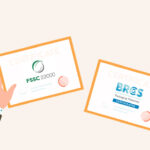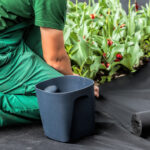Polypropylene is a popular type of plastic that many products around us are made from. This plastic is very useful because it’s strong and doesn’t react with water or many chemicals. You can find polypropylene in food packaging, bottles, and healthcare products.
Many people ask, “Is polypropylene safe?” because they worry about chemicals like BPA in plastics. BPA can be harmful, and it’s important to know which plastics have it and which do not. That’s why it matters whether polypropylene is free from BPA, especially when it comes to items we use every day. We want to make sure everything we use is safe for our health.
What is Polypropylene?
Many people use polypropylene fabric because it is very strong and lasts long. It doesn’t break easily and can handle a lot of wear and tear, making it great for making things like containers and kids’ toys that need to be tough.
One of the best things about polypropylene is that it doesn’t react with water or most chemicals. This means it won’t be damaged easily by cleaning agents or foods. It’s also good with heat, which means it can be used in microwaves and dishwashers without melting or warping.
Because of these properties, polypropylene is a reliable and safe choice for making many everyday items.
Is Polypropylene Safe?
Polypropylene is considered very safe for human use. It does not contain harmful chemicals like BPA, which can affect our health. Because of this, polypropylene is used often in things we use daily, such as food containers and baby bottles.
Important groups like the FDA in the United States and the EFSA in Europe have carefully checked polypropylene. They say it is safe to use for storing food and drinks. These certifications mean that experts have tested polypropylene and found that it does not release harmful substances into food or water.
So, when you use products made from polypropylene, you can feel confident that they are safe for you and your family.
Is Polypropylene BPA Free?
Polypropylene is a naturally BPA-free plastic. BPA, or bisphenol A, is a chemical that some plastics use during their making. However, polypropylene does not need BPA at all in its manufacturing process.
Polypropylene is BPA-free because of its chemical structure. It is made without BPA, so this chemical cannot be in polypropylene products. This makes polypropylene a great choice for food containers and water bottles because it is safe and contains no BPA that could leak into your food or drink.
Using polypropylene means choosing a safe material that keeps you and your family away from harmful chemicals.
Is polypropylene safe for food?
Yes, polypropylene is safe for food.
Polypropylene (PP) is a type of plastic that is commonly used in food packaging. It is strong, lightweight, and doesn’t react with food or liquids, making it a popular choice for food containers, wrappers, and bottles. It is also heat-resistant, so it can be used to store hot food or in microwaves.
The Food and Drug Administration (FDA) approves polypropylene for use in food contact materials. It does not release harmful chemicals into food and is considered a safe and hygienic option for storing and packaging food items.
Advantages of Using Polypropylene
Polypropylene is a great choice over other plastics for several reasons, especially when it comes to safety and health:
- Safety: Polypropylene is BPA-free, which means it doesn’t have the harmful chemical bisphenol A that some other plastics contain. This makes it a safer option for food containers and baby products.
- Heat Resistance: This plastic can handle heat well, so you can use it in the microwave or clean it in the dishwasher without worrying about it melting or releasing harmful chemicals.
- Durability: Polypropylene is very tough and resistant to breaking, which means products made from it last a long time, even with everyday use.
- Chemical Resistance: It doesn’t react with water, detergents, or most acids, which makes it ideal for containers that hold cleaning supplies or personal care items.
- Recyclable: Polypropylene is recyclable, which helps reduce waste and makes it a more environmentally friendly option than plastics, which are harder to recycle.
At Anita Plastics: Products Made From Polypropylene
At Anita Plastics, we choose polypropylene for various products due to its safety, durability, and environmental benefits. Here are some of the key items we produce from polypropylene:
- PP Woven Bags: Our PP woven bags are perfect for carrying and storing a wide range of products. Polypropylene’s strength and resistance to tearing make these bags ideal for agricultural products, retail goods, and even construction materials.
- BOPP Bags: Biaxially Oriented Polypropylene (BOPP) bags offer excellent clarity, strength, and moisture resistance, making them great for packaging that needs to look good and perform well. These are commonly used for retail packaging of foods and consumer goods where visual appeal and durability are critical.
- Landscape Fabric (Ground Cover): Polypropylene landscape fabric is tough against the elements and effective in weed control, promoting healthy gardens and landscapes. Its permeability allows water and nutrients to reach the soil while keeping weeds at bay.
- Soil Stabilization (Geotextile Fabric): Our geotextile fabric stabilizes soil, improving the durability and safety of roadways and construction sites. Polypropylene’s robustness suits high-stress applications like erosion control and foundation stabilization.
Choosing products from Anita Plastics means selecting items that are made to last, safe for their intended use, and environmentally responsible.
The Bottom Line
At Anita Plastics, we prioritize using polypropylene for its superior qualities—safety, durability, and environmental friendliness. Our products, from PP woven bags and BOPP bags to landscape and geotextile fabric, showcase the material’s versatility in various applications. Polypropylene ensures that our offerings are high quality and contribute to sustainable practices. By choosing our polypropylene products, customers invest in items designed to perform excellently while supporting a healthier environment. Anita Plastics remains committed to delivering products that meet the highest safety and efficacy standards, proving that effective solutions and ecological responsibility can go hand in hand.
Frequently Asked Question
Is PP material safe
Yes, PP (polypropylene) material is generally safe. It’s non-toxic, lightweight, and often used in food containers, medical supplies, and fabrics. It’s also resistant to chemicals and doesn’t leach harmful substances, making it safe for everyday use.
Is polypropylene safe for food storage?
Yes, polypropylene is safe for food storage. It is approved by health authorities for direct contact with food. It doesn’t release harmful chemicals, is resistant to heat, and doesn’t absorb moisture, making it a good choice for keeping food fresh.
Is polypropylene plastic safe?
Yes, polypropylene plastic is safe. It is widely used in many everyday products, including food containers and packaging. It is non-toxic, durable, and approved by health authorities like the FDA for safe use with food and beverages.
Does Polypropylene Contain BPA?
No, polypropylene does not contain BPA (bisphenol A). BPA is found in some plastics, especially polycarbonate and epoxy resins. Polypropylene is a different type of plastic made from a polymer that does not use BPA in its production. This makes polypropylene a safer choice for many applications, such as food containers and packaging.
Is Polypropylene Harmful?
No, polypropylene is not harmful. It is a safe plastic commonly used in food containers, medical products, and fabrics. It does not contain harmful chemicals like BPA and is non-toxic. Polypropylene is also resistant to heat, so it doesn’t release dangerous substances when heated. It’s widely approved for use in items that come into contact with food and skin, making it safe for everyday use.
Is Polypropylene Toxic?
No, polypropylene is not considered toxic. It is safe for many uses, including food packaging and containers. It does not release harmful chemicals when used correctly. However, always check product labels to ensure safety for specific applications.
is polypropylene food safe?
Yes, polypropylene is generally considered safe for food use. It’s a type of plastic that doesn’t react with food or liquids, making it ideal for food storage and packaging. Polypropylene is resistant to moisture, oils, and chemicals, helping to keep food fresh and protected.
Polypropylene also has a high heat tolerance, so it can be safely used in microwaves and dishwashers. It’s often labeled with a “5” inside the recycling symbol, making it easy to identify as food-safe. However, always check product labels to confirm that specific containers or packaging are FDA-approved for food use.




